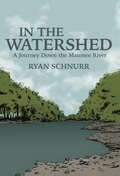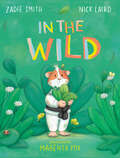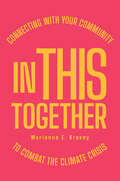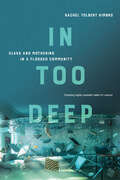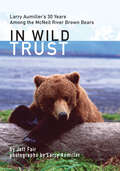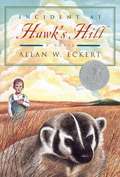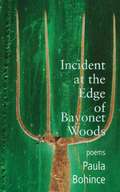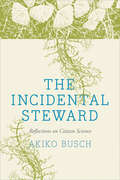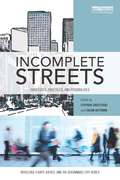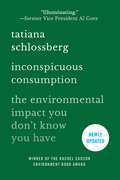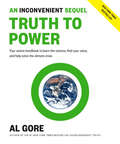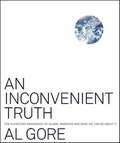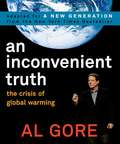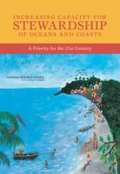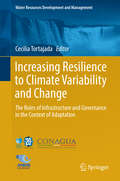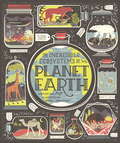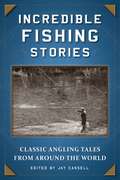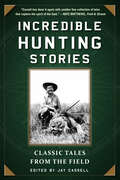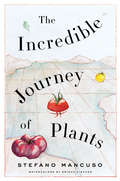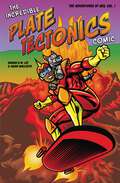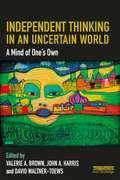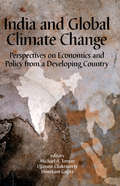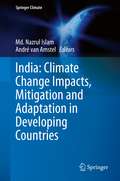- Table View
- List View
In the Watershed: A Journey Down the Maumee River
by Ryan Schnurr&“An engaging narrative . . . braiding together [Schnurr&’s] personal observations with history, science, and folklore.&” —Scott Russell Sanders, author, Earth Works: Selected Essays and A Conservationist Manifesto For several years, Ryan Schnurr watched media coverage of Lake Erie algae blooms with a growing sense of unease. An Indiana native, he wanted to learn more about role of the Maumee River in the lake&’s environmental woes: the Maumee is Lake Erie&’s largest tributary and the center of the largest watershed in the region, spanning more than 6,600 square miles of land. So in the summer of 2016, Schnurr walked and canoed the length of the river from its headwaters in Fort Wayne, Indiana to its mouth in Toledo, Ohio. In The Watershed: A Journey Down the Maumee River is the story of that voyage. As he walks the banks, Schnurr tells us the history of the river, from its formation by glaciers, function in Native American and American history, uses by industry, and role in current economic and environmental issues. Part cultural history, part nature writing, and part narrative, In the Watershed is a lyrical work of non-fiction with a timely and important warning at the core. &“What is happening in Lake Erie,&” Schnurr tells us, &“is a disaster by nearly any measure—ecologically, economically, socially, culturally.&” &“The Maumee River [is] a rich, complex, and fragile place, and Schnurr is a superb guide through it.&” —Mark Athitakis, author, The New Midwest: A Guide to Contemporary Fiction of the Great Lakes, Great Plains, and Rust Belt &“Delightful.&” —Luis Alberto Urrea, author, The Devil&’s Highway and Into the Beautiful North
In the Wild
by Zadie Smith Nick LairdAcclaimed authors Zadie Smith and Nick Laird are back with a brand-new picture book about conquering new experiences and enjoying the great outdoors!Maud—the judo-suit-wearing guinea pig and proud oddball—is off into the wild, as is Kit, her owner. Both are slightly nervous about what they&’ll find in the great outdoors, but with a pinch of bravery—and a few Signature Moves—they&’ll make new friends and explore new worlds . . .A warm and endearing story celebrating the quiet power of being yourself.
In This Together: Connecting with Your Community to Combat the Climate Crisis
by Marianne E. KrasnyIn This Together explores how we can harness our social networks to make a real impact fighting the climate crisis. Against notions of the lone environmental crusader, Marianne E. Krasny shows us the power of "network climate action"—the idea that our own ordinary acts can influence and inspire those close to us. Through this spread of climate-conscious practices, our individual actions become collective ones that can eventually effect widespread change.Weaving examples of everyday climate-forward initiatives in with insights on behavioral and structural change, Krasny demonstrates how we can scale up the impact of our efforts through leveraging our community connections. Whether by inviting family, friends, or colleagues to a plant-rich meal or by becoming activists at climate nonprofits, we can forge the social norms and shared identities that can lead to change. With easy-to-follow dos and don'ts, In This Together shows us a practical and hopeful way forward into our shared future.
In Too Deep: Class and Mothering in a Flooded Community
by Rachel KimbroIn a small Texas neighborhood, an affluent group of mothers has been repeatedly rocked by catastrophic flooding—the 2015 Memorial Day flood, the 2016 Tax Day flood, and sixteen months later, Hurricane Harvey. Yet even after these disrupting events, almost all mothers in this neighborhood still believe there is only one place for them to live: Bayou Oaks.In Too Deep is a sociological exploration of what happens when climate change threatens the carefully curated family life of upper-middle-class mothers. Through in-depth interviews with thirty-six Bayou Oaks mothers whose homes flooded during Hurricane Harvey, Rachel Kimbro reveals why these mothers continued to stay in a place that was becoming more and more unstable. Rather than retreating, the mothers dug in and sustained the community they have chosen and nurtured, trying to keep social, emotional, and economic instability at bay. In Too Deep provides a glimpse into how class and place intersect in an unstable physical environment and underlines the price families pay for securing their futures.
In Wild Trust: Larry Aumiller's Thirty Years Among the McNeil River Brown Bears
by Jeff FairFor thirty years, Larry Aumiller lived in close company with the world’s largest grouping of brown bears, returning by seaplane every spring to the wilderness side of Cook Inlet, two hundred and fifty miles southwest of Anchorage to work as a manager, teacher, guide, and more. Eventually—without the benefit of formal training in wildlife management or ecology—he become one of the world’s leading experts on brown bears, the product of an unprecedented experiment in peaceful coexistence. This book celebrates Aumiller’s achievement, telling the story of his decades with the bears alongside his own remarkable photographs. As both professional wildlife managers and ordinary citizens alike continue to struggle to bridge the gap between humans and the wild creatures we’ve driven out, In Wild Trust is an inspiring account of what we can achieve.
¡Incendio forestal! (¡Arriba la Lectura!, Level J #20)
by Dennis FertigWon, Víctor y Beth quieren saber más sobre los incendios forestales. Una guardabosques responde a todas sus preguntas. NIMAC-sourced textbook
Incident at Hawk's Hill
by Allan W. EckertSix-year-old Ben is very small for his age, and gets along better with animals than people. One June day in 1870, Ben wanders away from his home on Hawk's Hill and disappears into the waving prairie grass. This is the story of how a shy, lonely boy survives for months in the wilds and forges a bond with a female badger. Based on a true story. A Newbery Honor Book.
Incident at the Edge of Bayonet Woods
by Paula Bohince"[Paula] Bohince is more naturalist than romantic, meaning that her poems above all honor their dark side, their realism, their edge."--Stanley PlumlySpanning decades and set on a decrepit farm, Incident at the Edge of Bayonet Woods begins with a speaker invoking her dead father. As details are gradually uncovered, we learn the father was murdered by a trusted laborer.Paula Bohince has received a "Discovery"/The Nation Award in 2007, the Grolier Poetry Prize, and grants from the Puffin and the Ludwig Vogelstein foundations. In 2008, Bohince will be the Amy Clampitt Resident Fellow in Massachusetts. She lives in Pennsylvania.
The Incidental Steward: Reflections on Citizen Science
by Akiko BuschA search for a radio-tagged Indiana bat roosting in the woods behind her house in New York's Hudson Valley led Akiko Busch to assorted other encounters with the natural world--local ecological monitoring projects, community-organized cleanup efforts, and data-driven citizen science research. Whether it is pulling up water chestnuts in the Hudson River, measuring beds of submerged aquatic vegetation, or searching out vernal pools, all are efforts that illuminate the role of ordinary citizens as stewards of place. In this elegantly written book, Busch highlights factors that distinguish twenty-first-century citizen scientists from traditional amateur naturalists: a greater sense of urgency, helpful new technologies, and the expanded possibilities of crowdsourcing. The observations here look both to precisely recorded data sheets and to the impressionistic marginalia, scribbled asides, and side roads that often attend such unpredictable outings. While not a primer on the prescribed protocols of citizen science, the book combines vivid natural history, a deep sense of place, and reflection about our changing world. Musing on the expanding potential of citizen science, the author celebrates today's renewed volunteerism and the opportunities it offers for regaining a deep sense of connection to place.
Incomplete Streets: Processes, practices, and possibilities (Routledge Equity, Justice and the Sustainable City series)
by Julian Agyeman Stephen ZavestoskiThe ‘Complete Streets' concept and movement in urban planning and policy has been hailed by many as a revolution that aims to challenge the auto-normative paradigm by reversing the broader effects of an urban form shaped by the logic of keeping automobiles moving. By enabling safe access for all users, Complete Streets promise to make cities more walkable and livable and at the same time more sustainable. This book problematizes the Complete Streets concept by suggesting that streets should not be thought of as merely physical spaces, but as symbolic and social spaces. When important social and symbolic narratives are missing from the discourse and practice of Complete Streets, what actually results are incomplete streets. The volume questions whether the ways in which complete streets narratives, policies, plans and efforts are envisioned and implemented might be systematically reproducing many of the urban spatial and social inequalities and injustices that have characterized cities for the last century or more. From critiques of a "mobility bias" rooted in the neoliberal foundations of the Complete Streets concept, to concerns about resulting environmental gentrification, the chapters in Incomplete Streets variously call for planning processes that give voice to the historically marginalized and, more broadly, that approach streets as dynamic, fluid and public social places. This interdisciplinary book is aimed at students, researchers and professionals in the fields of urban geography, environmental studies, urban planning and policy, transportation planning, and urban sociology.
Inconspicuous Consumption: The Environmental Impact You Don't Know You Have
by Tatiana SchlossbergFrom a former New York Times science writer, this urgent call to action will empower you to stand up to climate change and environmental pollution by making simple but impactful everyday choices.With urgency and wit, Tatiana Schlossberg explains that far from being only a distant problem of the natural world created by the fossil fuel industry, climate change is all around us, all the time, lurking everywhere in our convenience-driven society, all without our realizing it. By examining the unseen and unconscious environmental impacts in four areas-the Internet and technology, food, fashion, and fuel - Schlossberg helps readers better understand why climate change is such a complicated issue, and how it connects all of us: How streaming a movie on Netflix in New York burns coal in Virginia; how eating a hamburger in California might contribute to pollution in the Gulf of Mexico; how buying an inexpensive cashmere sweater in Chicago expands the Mongolian desert; how destroying forests from North Carolina is necessary to generate electricity in England. Cataloging the complexities and frustrations of our carbon-intensive society with a dry sense of humor, Schlossberg makes the climate crisis and its solutions interesting and relevant to everyone who cares, even a little, about the planet. She empowers readers to think about their stuff and the environment in a new way, helping them make more informed choices when it comes to the future of our world. Most importantly, this is a book about the power we have as voters and consumers to make sure that the fight against climate change includes all of us and all of our stuff, not just industry groups and politicians. If we have any hope of solving the problem, we all have to do it together.
An Inconvenient Sequel: Your Action Handbook to Learn the Science, Find Your Voice, and Help Solve the C limate Crisis
by Al GoreA New York Times bestseller!The follow up to the #1 New York Times bestselling An Inconvenient Truth and companion to Vice President Al Gore’s new documentary, An Inconvenient Sequel: Truth to Power, this new book is a daring call to action. It exposes the reality of how humankind has aided in the destruction of our planet and delivers hope through groundbreaking information on what you can do now.Vice President Gore, one of our environmental heroes and a leading expert in climate change, brings together cutting-edge research from top scientists around the world; approximately 200 photographs and illustrations to visually articulate the subject matter; and personal anecdotes and observations to document the fast pace and wide scope of global warming. He presents, with alarming clarity and conclusiveness (and with humor, too) that the fact of global climate change is not in question and that its consequences for the world we live in will be assuredly disastrous if left unchecked. Follow Vice President Gore around the globe as he tells a story of change in the making. He connects the dots of Zika, flooding, and other natural disasters we’ve lived through in the last 10+ years—and much more. The book also offers a comprehensive how-to guide on exactly how we can change the course of fate. With concrete, actionable advice on topics ranging from how to run for office to how to talk to your children about climate change, An Inconvenient Sequel will empower you to make a difference—and lets you know how exactly to do it. Where Gore’s first documentary and book took us through the technical aspects of climate change, the second documentary is a gripping, narrative journey that leaves you filled with hope and the urge to take action immediately. This book captures that same essence and is a must-have for everyone who cares deeply about our planet.
An Inconvenient Truth: The Planetary Emergence of Global Warming and What We Can Do About It
by Al GoreOur climate crisis may appear to be happening slowly but in fact it is happening very quickly, and has become a true planetary emergency.
An Inconvenient Truth: The Crisis of Global Warming (Adapted)
by Al Gore Jane O'ConnorFormer Vice President Al Gore's New York Times #1 bestselling book is a daring call to action, exposing the shocking reality of how humankind has aided in the destruction of our planet and the future we face if we do not take action to stop global warming. Now, Viking has adapted this book for the most important audience of all: today's youth, who have no choice but to confront this climate crisis head-on. Dramatic full-color photos, illustrations, and graphs combine with Gore's effective and clear writing to explain global warming in very real terms: what it is, what causes it, and what will happen if we continue to ignore it. An Inconvenient Truth will change the way young people understand global warming and hopefully inspire them to help change the course of history. .
Increasing Capacity for Stewardship of Oceans and Coast: A Priority for the 21st Century
by National Research Council of the National AcademiesMarine environments support the livelihoods, economies, and quality of life for communities around the world. But growth of coastal populations and increasing demands on marine resources are putting the future of ocean and coastal resources at risk through impacts such as overfishing, wetland drainage, climate change, and pollution of coastal waters. Given these demands, it is vital to build capacity--the people, the institutions, and technology and tools--needed to manage ocean resources. Unfortunately, many capacity building efforts focus on specific projects rather than on capacity building as goal unto itself, resulting in activities that are not funded or sustained past the typically short project lifetime. This book finds that the most successful capacity-building efforts meet the needs of a specific locale or region based on periodic assessments and include plans to maintain and expand capacity after the project ends. The report recommends ways that governments and organizations can help strengthen marine protection and management capacity, including conducting periodic program assessments, making plans to sustain funding, and developing leadership and political will. The book was produced at the request of Gordon and Betty Moore Foundation, the President's Circle of the National Academies, the David and Lucile Packard Foundation, the National Oceanic and Atmospheric Administration, the National Science Foundation, the Marisla Foundation, and the Curtis and Edith Munson Foundation.
Increasing Resilience to Climate Variability and Change
by Cecilia TortajadaThis book highlights the role that both infrastructure and governance play in the context of resilience and adaptation to climate variability and change. Eleven case studies analyze in-depth impacts of extreme events in projects, basins and regions in the Arid Americas (Unites States and Mexico), Australia, Brazil, China, Egypt, France, Nepal, Mexico, Pakistan, Turkey and South Africa. They discuss the importance of infrastructure (mainly reservoirs) in adaptation strategies, how planning and management aspects should improve in response to changing climatic, economic, social and environmental situations and what the management, institutional and financial challenges would be for their implementation. Governance aspects (policies, institutions and decision making) and technical and knowledge limitations are a substantial part of the analyses. The case studies argue that reservoirs are essential to build resilience contributing to adaptation to climate variability and change. However, that for them to be effective, they need to be planned and managed within a governance framework that considers long-term perspectives and multi-sector and multi-level actor needs and perspectives.
The Incredible Ecosystems of Planet Earth
by Rachel IgnotofskyAn illustrated tour of our planet's ecosystems both large and small, from reefs, deserts and rainforests to a single drop of water - from the bestselling author of Women in Science. Through exquisite illustrations, maps and infographics, bestselling author Rachel Ignotofsky explains how our planet works, from its incredible ecosystems and the plants and animals that live there to the importance of biodiversity, weather cycles and more. Including information on the dangers of climate change and ideas for how to protect Planet Earth, this utterly charming guide is the perfect gift for all nature-loving readers on the planet we call home.
Incredible Fishing Stories: Classic Angling Tales from Around the World
by Jay CassellFishing is many things to many people. To some, quietly dangling a worm for a sunfish in a local farm pond is not only exciting, but relaxing and reflective. To others, it’s all about the adventure of traveling to exotic locales and fishing for ten-pound rainbow trout in Alaska or 100-pound tarpon in Central America. To others, it’s an integral part of life, not just a pastime but something to live for. Still others feel compelled to write about it, to try to understand this sport that grips so many. In this collection, you’ll read works from celebrated writers that aim to explore the mysterious grip that fishing has held on so many of us. Within these pages, the reader can: Join Rudyard Kipling as he chases a cow that has stolen his minnow Examine the philosophical side of angling with Thaddeus Norris Fish the Ohio River with John James Audubon Learn what it’s like to fish for Great Lakes steelhead with Jerry Hamza Get used to fishing alongside Alaskan brown bears with Richard Chiappone And many more fishing escapades! With more than three dozen photographs and illustrations that masterfully bring these stories to life, Incredible Fishing Stories is a must-have for every angler looking to share in the joy of their chosen sport.
Incredible Hunting Stories: Classic Tales from the Field
by Jay CassellA diverse collection of remarkable stories that represent the universal thrill of the hunting experience.From stalking the big game of the African savannah, to grouse shooting in the American Northeast, to bear hunting in the Pacific Northwest, a hunter’s experience is as varied as the terrain that he or she traverses. But what is universal is the joy and elation that a hunter experiences while out in the field. Found in this collection are timeless works from celebrated writers that aim to explore the mysterious grip that hunting has held on the hearts and imaginations of those it ensnares for centuries. Within these pages, the reader can:Join Theodore Roosevelt on some of his most legendary hunting tripsSnare woodland birds with Lamar UnderwoodBring down a killer lion with Colonel J. M. PatersonTriumph with Christopher Batin as he brings down a wolfAnd enjoy many more hunting adventures!With more than three dozen photographs and illustrations that masterfully bring these stories to life, Incredible Hunting Stories is a must-have for every hunting and outdoor enthusiast looking to share in the joy of their chosen sport.
The Incredible Journey of Plants
by Stefano MancusoIn this richly illustrated volume, a leading neurobiologist presents fascinating stories of plant migration that reveal unexpected connections between nature and culture.When we talk about migrations, we should study plants to understand that these phenomena are unstoppable. In the many different ways plants move, we can see the incessant action and drive to spread life that has led plants to colonize every possible environment on earth. The history of this relentless expansion is unknown to most people, but we can begin our exploration with these surprising tales, engagingly told by Stefano Mancuso. Generation after generation, using spores, seeds, or any other means available, plants move in the world to conquer new spaces. They release huge quantities of spores that can be transported thousands of miles. The number and variety of tools through which seeds spread is astonishing: we have seeds dispersed by wind, by rolling on the ground, by animals, by water, or by a simple fall from the plant, which can happen thanks to propulsive mechanisms, the swaying of the mother plant, the drying of the fruit, and much more. In this accessible, absorbing overview, Mancuso considers how plants convince animals to transport them around the world, and how some plants need particular animals to spread; how they have been able to grow in places so inaccessible and inhospitable as to remain isolated; how they resisted the atomic bomb and the Chernobyl disaster; how they are able to bring life to sterile islands; how they can travel through the ages, as they sail around the world.
The Incredible Plate Tectonics Comic: The Adventures of Geo, Vol. 1
by Kanani K. Lee Adam WallentaThe Incredible Plate Tectonics Comic is a wild adventure in earth science. Follow Geo and his robot dog, Rocky, as they travel back in time to Pangea, surf a tsunami, and escape an erupting volcano—all in time for Geo’s first-period science test!The journey starts 200 million years ago and takes you to modern-day Hawai’i, the ocean floor, and deep inside the Earth.You’ll learn:–How scientists developed the theory of plate tectonics–Why the Earth shakes–What’s in the center of the Earth–How volcanoes can form islandsThe Incredible Plate Tectonics Comic will teach you about geology in a fun, lively, and visual way.Ages 8+. Recommended for grade 6 and up
Independent Thinking in an Uncertain World: A Mind of One’s Own
by Valerie A. Brown John A. Harris David Waltner-ToewsAny effective response to an uncertain future will require independently thinking individuals working together. Human ideas and actions have led to unprecedented changes in the relationships among humans, and between humans and the Earth. Changes in the air we breathe, the water we drink and the energy we use are evidence of Nature – which has no special interest in sustaining human life – looking out for itself. Even the evolutionary context for humans has altered. Evolutionary pressures from the digital communication revolution have been added to those from natural systems. For humans to meet these challenges requires social re-organisation that is neither simple nor easy. Independent Thinking in an Uncertain World explores workable, field-tested strategies from the frontiers of creating a viable future for humans on Earth. Based on research results from hundreds of social learning workshops with communities worldwide, many of them part of Australian National University’s Local Sustainability Project, authors with diverse interests explore the gap between open-minded individual thinking and closed socially defined knowledges. The multiple dimensions of individual, social and biophysical ways of thinking are combined in ways that allow open-minded individuals to learn from one another.
India and Global Climate Change: Perspectives on Economics and Policy from a Developing Country
by Michael A. Toman Ujjayant Chakravorty Shreekant GuptaThough the impact of climate change will most likely be greatest with the already poor and vulnerable populations in the developing world, much of the writing about the costs and benefits of different policies to reduce greenhouse gas (GHG) emissions is by Western scholars, working in advanced industrialized economies. Drawing the majority of its contributions from authors based at Indian universities and other research centers, India and Global Climate Change provides a developing world perspective on the debate. With a population of over one billion, and an economy that is undergoing substantial restructuring and greatly increased economic growth after a number of years of stagnation, India has an exceptional stake in the debate about climate change policy. Using the Indian example, this volume looks at such policy issues as the energy economy relationships that drive GHG emissions; the options and costs for restricting GHG emissions while promoting sustainable development; and the design of innovative mechanisms for expanded international cooperation with GHG mitigation.
India: Climate Change Impacts, Mitigation and Adaptation in Developing Countries (Springer Climate)
by Md. Nazrul Islam André Van AmstelClimate change will lead to many changes in global development and security especially energy, water, food, society, job, diplomacy, culture, economy and trade. The Intergovernmental Panel on Climate Change (IPCC) defines climate change as: “Any change in climate over time, whether due to natural variability or as a result of human activity.” Global climate change has emerged as a key issue in both political and economic arenas. It is an increasingly questioned phenomenon, and progressive national governments around the world have started taking action to respond to these environmental concerns. This book discusses the issue of food and water security in India under the context of climate change. It provides information to scientists and local government to help them better understand the particularities of the local climate. It offers insight into the changes to natural ecosystems which have affected the local Indian population. Climate change is one of the biggest challenges to Indian society. It can lead to serious impacts on production, life and the environment. Higher temperatures and sea level rise can lead to flooding and cause water salinity problems which bring about negative effects on agriculture and high risks to industry and socio-economic systems in the future.
